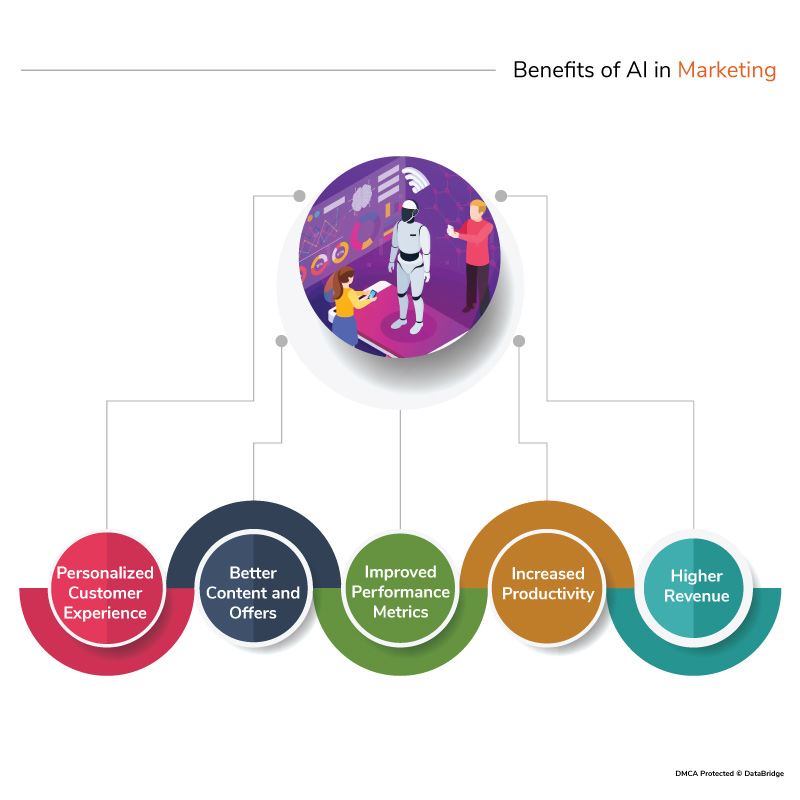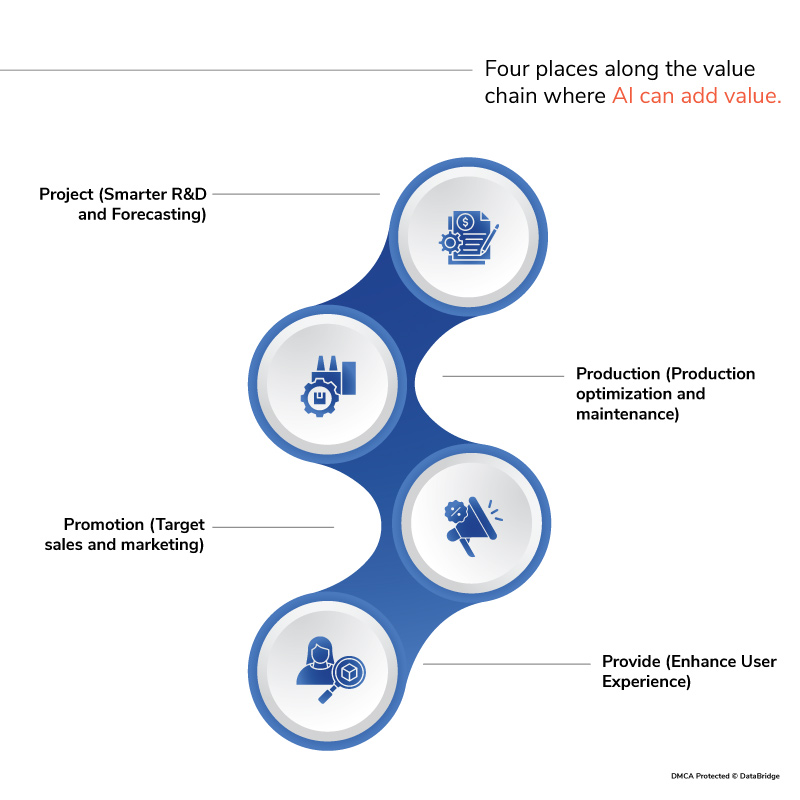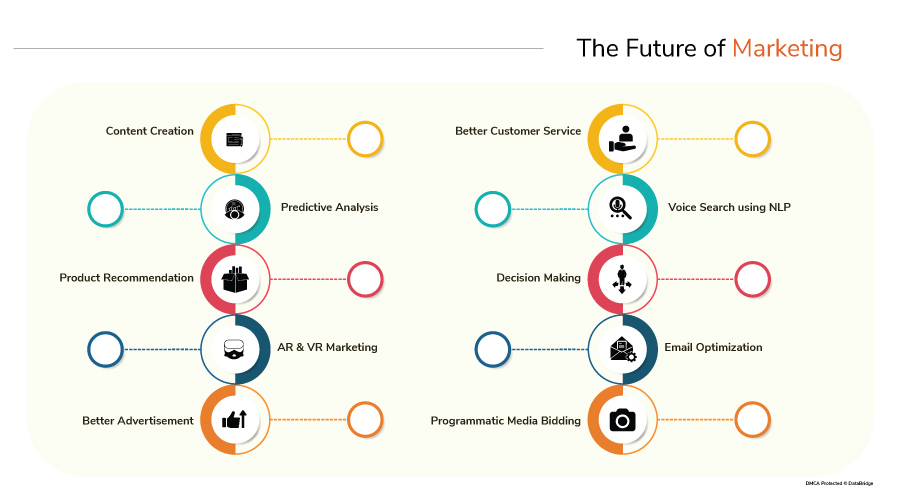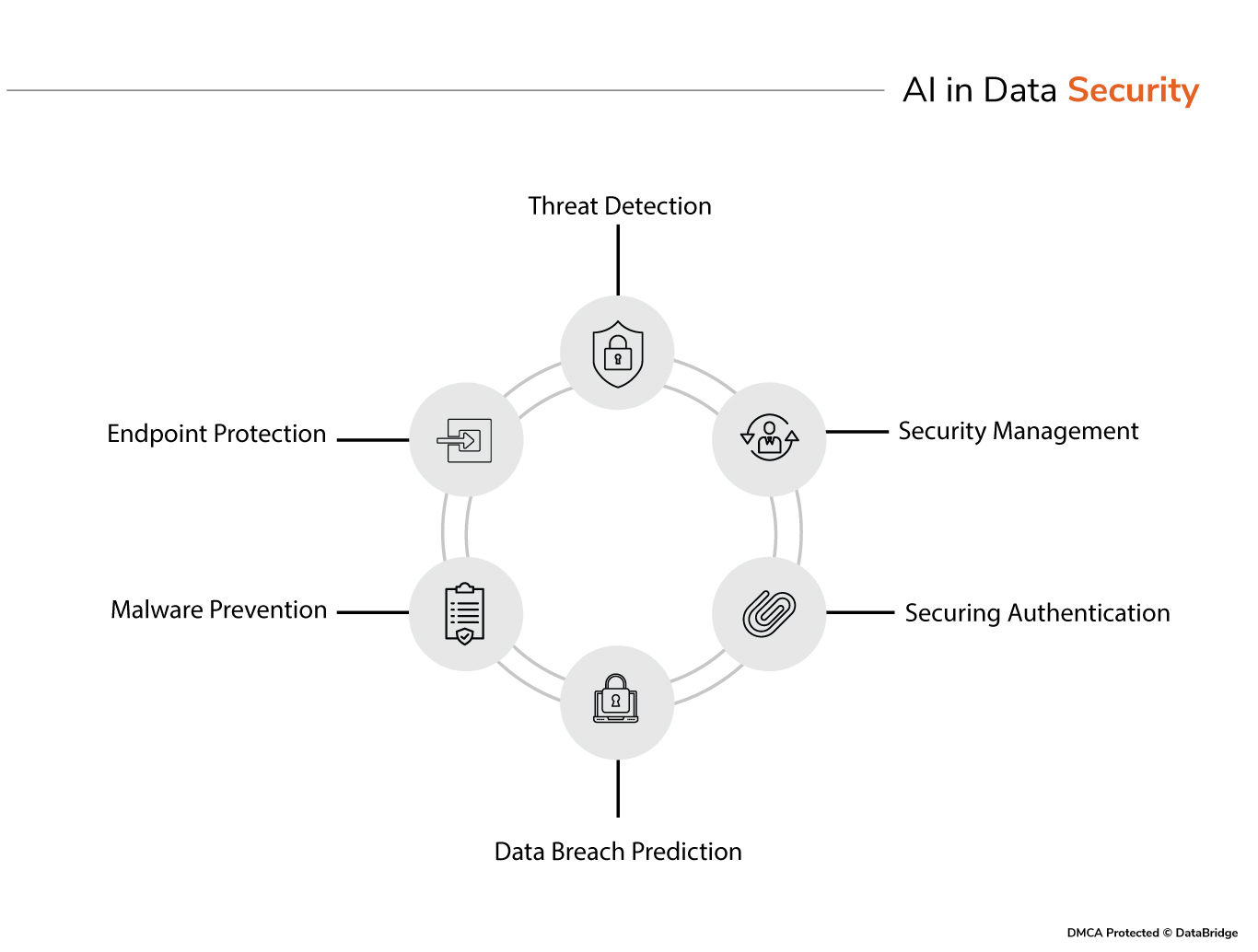Overview
AI technologies and approaches are employed, particularly in the digital marketing sector, to create better goods and services. Moreover, it will help to reach out to the target audience more easily and make sophisticated marketing selections. AI helps digital marketers to create different strategies, optimize advertising, manage consumer relationships, and gradually increase return on investment. Numerous built-in machine learning tools control decision-making and ongoing learning through observation in daily system processes.
The technical parts namely data analysis of digital marketing will gain from future developments in the artificial intelligence field. AI will help to simplify difficult marketing issues, automate tiresome and repetitive operations, and enable new digital ecosystem trends that will increase user productivity. The Google Cloud Platform and voice assistants with artificial intelligence are only two of the tools that marketers currently use in their routine promotional campaigns. This analyzes data, handles both outdated and new inputs, looks for patterns, and helps systems learn from past or repeated encounters. To maximize revenues, using AI in the marketing sector and retail business has several advantages. Online shopping, which responds to consumers' immediate demands with additional convenience, has replaced traditional shopping techniques and become a significant component of the growing digital revolution thanks to artificial intelligence. As per the current state of affairs, we believe that further advancements in AI can drastically automate and change the marketing industry's future. Artificial intelligence will aid marketers in selecting the most effective approaches to better results while lowering the likelihood of human error.
Figure 1: Benefits of AI in marketing

AI digital marketing will help to gain a competitive edge:
- AI can analyze data to forecast the purchasing patterns and choices of your target market
- Using AI data, you can provide your audience with what they really want and help to enhance the user experience, and surge business efficiency by up to 40%
- AI will eliminate the guesswork with its data-driven research to develop a digital marketing strategy for the company that is more successful
- A variety of tedious chores can be automated using AI algorithms. This can boost productivity whiles also helping you save time and money
- ROI is increased since AI facilitates decision-making and aids in the production of more effective content. AI digital marketing techniques enable you to connect with the right people with better deals
The global artificial intelligence in marketing market has witnessed a substantial growth in recent years owing to the increase in the utilization of social media platform for advertisement. Adding to this, growing usage of AI related product & services along with the advancement in big data analystics tends to be the major factors enhancing the growth in the forecast period. According to the Data Bridge Market Research analysis, the market for global artificial intelligence in marketing market is projected to grow at a compound annual growth rate (CAGR) of 28.13% from 2021 to 2028.
To learn more about the study, visit: https://www.databridgemarketresearch.com/reports/global-artificial-intelligence-in-marketing-market
Figure 2: Four places along the value chain where AI can add value.

Examples of artificial intelligence transforming digital marketing functions
- AI in Social Media Marketing (SMM) - To create textual or visual content for social media sites, such as posts, hashtags, and images, marketers use AI-enabled tools. An SMM strategy's performance can be tracked and tracked using these AI-driven solutions. AI aids in the personalization of social media material for each user based on their preferences, geographic location, and other details
- AI in Content Marketing - Content marketing has become a standard method of advertising across industries due to the increasing need for content-based advertisements. Content marketers can use AI to determine the content type that their current and potential clients are interested in. Applications powered by AI can be used to create and edit content. For instance, AI-powered tools such as Co-schedule, Grammarly, Hemingway Editor, and Jarvis assist content writers in creating catchy headlines for blogs and advertisement copy quickly. The public has recently become interested in two cutting-edge AI apps i.e. ChatGPT and BARD that can produce conversational solutions to nearly any topic. In the coming years, AI will handle all aspects of content development, including ad copy creation and generating ad graphics. AI can also be used to improve the existing content. AI technologies and methodologies can be applied for monitoring the content’s performance and providing insights on what is performing effectively and what areas require development
- AI in Customer Relationship Management (CRM) - Digital marketers can customize client interactions and provide a better user experience with unique promotions or incentives to win back lost consumer loyalty with the use of AI-driven applications.
For instance,
- Starbucks released a mobile app and loyalty card for regular customers to buy. Then they can use it to accrue points, which can be used for rewards, coupons, and discounts. Starbucks uses AI to keep track of customer purchase information. The precise time, day of the week, location, what they ordered, and even the weather on that particular day are all captured! This is then utilized to develop future, customized consumer recommendations
Natural language processing (NLP) is another AI-powered technology that chatbots employ to segment customer enquiries, reply swiftly to urgent user demands, and limit discontent by addressing every client in real time. Additionally, AI-powered CRM makes use of predictive analysis to derive in-depth insights into consumer behavior and preferences based on previous interactions and other data. Additionally, it can be used to generate leads and boost conversion rates
- AI in Email Marketing - An organization can help its email marketing operations with AI in a variety of ways. It is used by businesses to categories their clientele into several groups according to factors like their hobbies, level of participation, past purchases, and more. In order to send email blasts to customers informing them of new product releases, exclusive offers or discounts, and other company and product-related information, segmented email lists are created using AI-driven applications. Additionally, AI can assist email marketers in recognizing scam emails. Create a separate folder for spam emails to be sent to in order to keep them from getting to inboxes
- AI in Search Engine Optimization (SEO) - AI in SEO aids online marketers in improving link-building, website analysis, and keyword research. Large amounts of data are analyzed by AI-enabled SEO in order to find keywords pertinent to the offered goods or services. ...and employ them to raise the position of the website on the SERP, or search engine results page
Several ways that artificial intelligence is advancing the field of digital marketing
Figure 3: Different ways where AI will change the marketing future

- Product Searching and Recommendations- Artificial intelligence not only improves the accuracy of finding products that users wish to purchase but also display product recommendations accordingly. Finding the things that customers want to buy is made easier by AI-powered product suggestions. On the other side, the correct AI solutions allow digital marketers to estimate what products the clients will buy more precisely and promptly. Sales go up as a result, and brands can promote things that existing consumers have found to be worthwhile and effective in front of prospective clients. Intelligent AI digital marketing recommendations lead to improved sales and customer retention and elevated return rate
- Dynamic Pricing - This method involves gathering enormous volumes of dynamic data in order to select product prices that will maximize overall revenue. For instance, in the rapidly changing digital economy, an e-commerce platform must dynamically change prices by fusing multiple machine learning algorithms with AI. Pricing methods are fundamentally re-optimized based on factors including inventory levels, traffic patterns, stock remaining, and product-related sentiment research
- Content Curation and its Marketing - Software with AI capabilities can choose what material to be produce for a platform and when to distribute it. AI-driven content marketing will make use of a variety of tools that will also give content producers data-driven insights and feedback. This means that by building a constant feedback loop, marketers may improve their capacity for content generation and assess how they stack up against rivals
- Behavioral Analytics of Consumers - In order to predict a customer's future behaviors based on their past personality attributes and behavior, AI uses statistical models and algorithms. To ascertain the general public's purchasing patterns, AI Customer Behaviour Analytics employs a range of model behaviors. It gives businesses a head start on managing customers by giving them insight into customer behavior and how it will change. This helps an organization to maintain close to its profit, sensitivity, compliance, and other risk conditions while also keeping up with client demand. Therefore, industry trends can be anticipated by merging machine learning statistics and AI in digital marketing
- Fraud Protection - Cybersecurity has been revolutionized and the risk of data breaches has decreased owing to the application of artificial intelligence in digital marketing to control user access to corporate resources. Combining AI with cybersecurity for fraud detection is a prevalent practice. To prevent data from being duplicated by an unauthorized user and to block or permit particular user activity including shady logins, unauthorized purchases, and identity theft, artificial intelligence (AI) algorithms have been put in place
Figure 4: Different ways where AI will change the marketing future

Challenges of AI in Cyber-Security
- The organization needs to invest more money and resources in developing and sustaining AI systems
- Cyber criminals may also employ AI algorithms to carry out their most sophisticated attacks
- A vast amount of data is needed for AI systems to operate successfully. If the system is not provided with enough content, it produces false results
- It takes a lot of effort for the organization to train the AI system using datasets with various collections of malware, benign code, and abnormalities
- The system is expensive, making it unaffordable for small businesses
- Channel-Specific Promotions - A higher portion of channel-specific promotions consists of personalized mobile marketing and emails that are specially customized to the clients. Emails, Whatsapp messages, and any other messages addressed to a particular customer fall under this category. People want personalized emails that are pertinent to them in this era of automatically generated communications. AI in digital marketing can help businesses send targeted emails and messages for their campaigns by examining user behaviour and preferences. With the use of AI, marketers can monitor the success of their campaigns, from broad-reaching messaging to specific social media posts.
- Integrating Augmented and Virtual Reality - In the following years, the development of augmented reality (AR) and virtual reality (VR) will be accelerated by artificial intelligence (AI). The online shopping experience will be improved by augmented reality, with help from visual intelligence. To give the user instructions in an engaging way, an AI model recognizes, reads, and translates the provided text into an image. Augmented reality APIs then overlay the translated text and images. Augmented Reality (AR) manuals are online user guides that train and direct users remotely using visual components, audio, or other sensory technology. As a result, digital marketing powered by artificial intelligence will hasten the adoption of AR and VR by enabling consumers to search for products and customize them however they see fit. Consumer can now try on multiple colours of the same dress while shopping for gowns to see which one best suits them
For instance,
- TopShop, the British multinational apparel retailer has developed virtual changing rooms for its store in Moscow using AI technology. Customers may simply stand in front of a screen and a camera in this store to see how a dress appears on them. The client can view their virtual representation when they are in front of the big screen. Customers can "try" various things thanks to artificial intelligence without entering a fitting room
- Swedish Furniture Company named IKEA is raising the bar for AI digital marketing. They are releasing an augmented reality (AR) app that will let users picture IKEA products in their own houses. Customers will be able to enter their room's dimensions on the app. They will then view a variety of objects with varying designs and life stages. Customers will be able to see a product as it would look in their own houses when they choose it. A customer can directly order a product via the app to make a purchase. Therefore, using AR, consumers may browse for furniture for their houses without having to leave the comfort of their homes
- The high-end clothing company Gucci has unveiled a digital recreation of the museum's virtual Italian location, the Gucci Garden. Visitors can look around the museum and ask for further details about the objects. The purpose of these augmented reality platforms is to raise brand exposure, particularly among younger consumers who enjoy playing video games and are accustomed to using digital interfaces. In light of the current pandemic, some teenagers and young children are more accustomed to the online world than to actual public spaces. This customer segment is important both now and in the future.
The augmented reality and virtual reality market has witnessed a substantial growth in recent years owing to the growing demand for AR & VR in retail and e-commerce. Moreover, increase in technological advancement, growing investment and availability of such devices at reasonable rates are other factors propelling the market growth in forecast period. Consumers and retailers will utilize these technology as a tool to create a shopping experience that provides consumers with the convenience they desire without taking away the human element in the future of retail. According to the Data Bridge Market Research analysis, the market for global augmented reality and virtual reality market is projected to grow at a compound annual growth rate (CAGR) of 69.0% from 2023 to 2029.
To learn more about the study, visit: https://www.databridgemarketresearch.com/reports/global-augmented-reality-and-virtual-reality-market
- Visual Search Capability - Instead of utilizing text or keywords that are controlled by AI algorithms, visual search is a technology that enables customers to search for any form of image online. The best example of visual search powered by AI at the moment in the digital industry is Google Lens. It is quite helpful for people who are unsure of how to precisely define what they are looking for or who are not familiar with the terminology associated with that word. Therefore, Visual Search is a useful alternative that solves the issue people encounter when they enter incorrect terms into the search field
- Video Marketing - Videos are an effective method for disseminating information and expertise. There has been a significant rise in the number of video viewers recently, particularly for live-streaming videos. Artificial intelligence is being used by businesses to increase the effectiveness of their video marketing initiatives. Utilizing AI, businesses can better understand their customers' viewing preferences, create personalized content, and ultimately increase their video Return on Investment (ROI). All of the aforementioned digital marketing tools can be accounted for as elements of continuing marketing plans that use real-time optimization to establish the framework for automated sales projections. Future AI developments will also enable organizations to function at maximum profitability, increase sales, and others
- Market Predictive Analytics - Artificial intelligence-enabled software can process enormous volumes of data, compile it, and use the patterns that emerge from it to create precise predictions. This gives marketers the tools to forecast the future using the dynamic content that is being gathered in real-time. Another crucial component of this analysis is market optimization, which enables real-time customization of measurements and better marketing tactics for the sale of goods and services. Two more elements that affect a campaign's general success include knowing the market's potential and doing competitor research. The analysis of market predictive analytics comprises identifying changes and updates made in real-time by competitors on various social media platforms, as well as monitoring their websites, forums, and other online properties
For instance,
- The world's largest online retailer, Amazon, employs AI-powered recommendation systems to deliver personalized ideas. These suggestions are essential for accelerating sales and boosting their earnings. The goods in customers' carts, the items they have liked, their purchase history, and what other users have purchased or viewed are all taken into account by Amazon's recommendation algorithms
The predictive analytics market has witnessed a substantial growth in recent years owing to the growing demand in real time analytics solutions for tracking and monitoring along with the increase in the utilization of both connected and integrated technologies which will enhance the market growth in forecast period. According to the Data Bridge Market Research analysis, the market for global predictive analytics market is projected to grow at a compound annual growth rate (CAGR) of 23.52% from 2021 to 2028.
To learn more about the study, visit: https://www.databridgemarketresearch.com/reports/global-predictive-analytics-market
- Digital Advertisements and Their Targeted Marketing - Artificial intelligence in digital marketing offers countless chances for businesses to develop creative ad campaigns across platforms such as Google, Facebook, and Instagram in addition to assisting marketers in reaching the correct audience. These platforms examine user data, including age, gender, demographics, interests, and other personal information, to offer the best experience possible. By using targeted marketing, AI algorithms can make sure that users see the most pertinent advertisements, enhancing the effectiveness of the produced digital ads. The company is paying the fee for each advertisement shown to any user, thus having the right to choose who should view their advertisement. The company must first anticipate the numerous consumer segments and use clever ideas in its digital marketing tactics if it wants to provide personalized customer experiences. Reaching the right audience is a requirement for any marketing strategy to succeed. Targeting customers is made simple for businesses with AI digital marketing. Additionally, AI digital marketing provides the potential for developing creative advertising strategies.
For instance,
- The American shoe company Airwalk promoted its limited-edition Airwalk Jim shoes using augmented reality and geolocation. For this campaign, they built invisible pop-up shops in New York and Los Angeles using AR software. People have to download their app and visit either Washington Square Park or Venice Beach to access these establishments. Users might locate GPS-linked virtual sneakers at these sites. After finding these stores, users were directed to Airwalk's online store. They had to enter a passcode link that was provided to them on the website in order to finalize their transaction. AI digital marketing is the only tool that can enable this innovation
- Data Collection, Studying and Compiling Data - The segmentation of raw data gathered in a variety of fields, including consumer profiling, corporate intelligence, and online sale analysis, is made possible by artificial intelligence. By identifying data kinds, finding potential links between datasets, and identifying recurrent trends across numerous channels, AI in digital marketing may help marketers make informed decisions. Further applications include the automation and acceleration of data preparation chores, the correct prediction of future events using created data models, and the efficient support of data exploration
- Identifying Micro Influencers - Smaller influencers that are most likely to connect with companies and audiences are already being found using AI algorithms. With the ongoing growth of the digital world, machine learning (ML) and artificial intelligence (AI) are changing the influencer marketing landscape by having the capacity to absorb excessive data in each proposal. Finding the proper authors, suggesting effective procedures, and producing more pertinent content are all advantages of AI-powered influencer marketing technology for brands. To determine which social media influencers to trust, they are also highly resourceful in analyzing their messaging and efficacy with previous brand relationships
- Efficient Handling Of Menu-Driven Catalogue - With the help of a variety of AI solutions, organizations may now reduce the time spent by teams creating product catalogs and onboarding vendors. This suggests that with AI product tagging choices and image moderation, businesses may produce and standardize catalog text and image content. AI in digital marketing also helps with better data positioning and assortment, as well as better visualizing the catalog to spot trends and gaps.
- Website Building and Designing – AI is used by well-known website builders namely Wix to generate websites that satisfy specific marketing goals. This software accelerates website creation by offering suggestions in real-time and utilizing AI. These tools use an algorithm to create websites and help programmers by offering recommendations for website layout and design. The content, call-to-action icon graphics, and finishing the ideal page layout are all that are required. Adding to this, website owners can create landing pages with the aid of Sacha, an artificial intelligence designer at FireDrop. To facilitate the design process, Sacha is set up to obey your orders
- Searching via Voice Recognition and Delivering Personalized Response - Customers can use Siri to set an alarm or Alexa to listen to music by using voice recognition technologies. As a marketer, one should be aware of their rising popularity on a global scale because this ground-breaking change emphasizes the value and importance of voice search SEO for any website. ROI is the ratio of an organization's net profit to its total cost of investment. This technology will help businesses determine their net profit over total investment cost (ROI) and increase organic traffic from regular searches
- Automated Customer Service - Artificial intelligence enables automated customer service features including message delivery, Chatbot responses, survey results that are calculated, and participation in other online forums. The most practical application of AI technology is chatbots. Virtual assistants powered by AI can swiftly reply to customer inquiries, gather thorough information about a good or service, and then provide guidance to help customers make the best choices
For instance,
- One of the companies effectively utilizing this AI digital marketing strategy to support human employees is the coffee giant Starbucks. The Starbucks Barista bot for Facebook Messenger is there if one only want its favourite coffee with minimal human interaction. It places your customized coffee order. Even complex commands are understood by the bot. Sophisticated orders can be put with customized demands in addition to straightforward "latte" orders. One can use the bot to quickly get coffee with phrases such as "double tall mocha nonfat extra hot no whip."
Public relationship management (PRM) chooses a customer-centric strategy that analyses the gathered customer data and selects the relevant data. CRM software with AI capabilities evaluates business data from emails, e-commerce activity, sales, Internet of Things (IoT) to produce data, and social media channels to produce automatic insights.
Conclusion
The technical parts of digital marketing, such as data analysis and customer persona comprehension, will gain from future developments in the artificial intelligence field. AI will help to simplify difficult marketing issues, automate tiresome and repetitive operations, and enable new digital ecosystem trends that will increase user productivity. Modern artificial intelligence will streamline and help in the optimization of marketing efforts in the area of digital marketing to meet the needs of an organization. To save human resources, digital assistants will communicate with consumers who already support personalized learning. Artificial intelligence will aid marketers in selecting the most effective approaches to better results while lowering the likelihood of human error. Although a significant portion of the digital marketing sector will continue to rely on human innovation, the content will always reign supreme, and humans will always handle operations and technicalities.